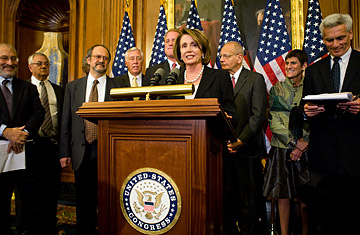
House Speaker Nancy Pelosi (C, D-CA) speaks during a news conference with House Democrats and prominent economists on Capitol Hill on October 13, 2008 in Washington, DC.
Many Democrats like to think of Barack Obama as a reincarnated JFK, but his congressional colleagues reached further back in time Monday to resurrect FDR and his pump-priming New Deal jobs program to help bolster a wobbly economy. "We need to address the fragility of markets, the stability of our economy," House Speaker Nancy Pelosi said as she prepared to meet behind closed doors to talk about the contours of a $150 billion stimulus plan with a high-powered squad of liberal economists including Joseph Stiglitz and Lawrence Summers, both of whom held senior posts during the Clinton Administration.
Pelosi made it clear that the Democrats see quick infusions of cash to working and middle-class families — not grants to Wall Street and banking tycoons that ultimately might trickle down their way — as key to restoring Main Street's vitality and confidence in the U.S. economy. She rattled off investments in "mass transit, roads, bridges, et cetera, schools and housing and...broadband" as givens. "That is something that we all know that we have to do," Pelosi said. Ideally, such investments could be a two-fer — pouring money into programs that might ultimately help curb U.S. demand for foreign oil. "Many of those green-collar jobs," she added, "are also blue-collar jobs."
Obama has proposed a similar plan. "We're going to put two million more Americans to work, rebuilding our crumbling roads and schools and bridges," he said last Thursday in Ohio. For those wondering how Washington can afford it, he has an answer that pleases his base, if not his budget-balancers: "If we can spend $10 billion a month in Iraq, we can spend $10 billion right here in the United States, rebuilding America."
Rep. John Boehner, the Ohio Republican who leads his party in the House, declared that nothing being discussed by the Democrats "will stabilize the economy in the long term." In a letter to Pelosi, he labeled her party's ideas "an irresponsible, business-as-usual approach that has earned this Congress the lowest approval ratings ever recorded in the history of modern polling." An emerging GOP proposal has tax cuts and accelerated energy exploration as its building blocks for economic recovery. Last month, the House approved a $56 billion stimulus that GOP senators blocked. It would have increased unemployment benefits, boosted food stamp payments, and funded work on highways and other infrastructure projects.
The stimulus package, which could possibly be dealt with during the congressional "lame duck" session following the election — and faces longer odds in the Senate — could pour up to $150 billion into the economy in the form of massive construction projects, grants to states and additional aid for food stamps and unemployment benefits. Some are calling it "Plan C," coming in the wake of "Plan A" — the Wall Street rescue package — and "Plan B," the effort now underway to recapitalize ailing banks and get credit, the lifeblood of economic health, flowing again. Both of those plans are to be funded by the $700 billion rescue package Congress recently approved. The stimulus would be the second such bill this year, following a $160 billion economic package that gave tax rebates of up to $600 per adult to fuel consumer spending slowed by higher food and fuel prices.
"There was remarkable agreement among all the economists here about what needed to be done," said Nobel economics laureate Stiglitz, who served as chairman of Clinton's Council of Economic Advisers. Any package must be "a comprehensive recovery program, not just based on trickle-down economics, not just giving money to the financial markets, but at least some of the money going directly to households, to meet infrastructure needs, to meet the variety of challenges facing our society today," he said.
To show their seriousness about the package, Pelosi and the Democrats actually came to work on Columbus Day, when the federal government — the Postal Service, the Pentagon, the Pension Benefit Guaranty Corp. and all the rest — was shut down. "Even a holiday of such importance could not stand in the way of our coming together here in Washington to deal with the financial crisis that is facing our country," Pelosi said after the Capitol session. FDR would certainly understand: he proclaimed the first Columbus Day in 1934, in the depths of the Great Depression.
(See Pictures of the Week here.)
(See the Top Races to Watch '08.)
(See a gallery of campaign gaffes here.)
